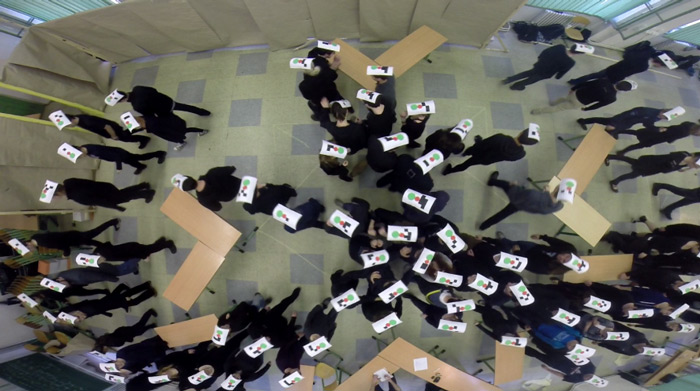Pedestrian Dynamics
Pedestrian Dynamics Research

This group aims to analyse and model pedestrian behaviour under various conditions. With the knowledge of pedestrian flow and its interaction to obstacles, public infrastructure may be improved from the view of efficiency as well as security. The research is provided mainly on microscopic approach on small scale systems, e.g. several joined rooms or one train unit, but it focuses on microscopic accuracy, respecting the individual features of each participant.
Our analytic team uses the records of cameras or other detectors to evaluate fundamental quantities as velocity, density and flow. The relations of these variables depend on infrastructure and participant’s preferences, but general phenomena may be observed. Focusing of some specific feature, egress experiments are organized to get dedicated data. The deep analysis of cause of flow decrease may prevent many bottleneck issues.
Our modeling team designs, develops and improves pedestrian motion models based on various principles – from simple macroscopic modes enabling analytic solution over force based models introducing social forces to sophisticated agent based systems. Calibration and verification process is run on our experimental data, which makes the whole team to close cooperation.
Members
Marek Bukáček
Ph.D. student at FNSPE CTU in Prague
- heterogeneity in pedestrian movement
- CA model of egress situations
- realization of egress experiments
- fundamental data analysis
Pavel Hrabák
assistant professor at FIT CTU in Prague
- application of Markov processes to pedestrian models
- mathematical analysis of totally asymmetric simple exclusion process in both 1D and 2D
- hand calculations of flow
Jana Vacková
Ph.D. student at FNSPE CTU in Prague
- microscopic analysis of pedestrian movement
- kernel estimates of pedestrian density
- decision-based model and its calibration
Graduates
Lenka Ščepánková
(TASEP on crossroad)
Matěj Kotrba
(metodology around density and flow)
František Gašpar
(Markov processes in CA models)
Marina Džabarjan
(methodology around density and flow)
Significant papers
- Bukáček, M., Pešková V., Najmanová H. Double-Deck Rail Car Egress Experiment: Microscopic Analysis of Pedestrian Time Headways. In: Springer Proceedings in Physics: 13th Conference on Traffic and Granular Flow (TGF 2019). 2020. s. 449-455. ISBN 9783030559724. DOI 10.1007/978-3-030-55973-1_55.
- Vacková, J., Bukáček, M. Follower-leader concept in microscopic analysis of pedestrian movement in a crowd. In Pedestrian and Evacuation Dynamics 2018. Collective Dynamics, 2020.
- Krbálek, M.; Hrabák, P.; Bukáček, M.: Pedestrian headways – Reflection of territorial social forces. Physica A: Statistical Mechanics and Its Applications. 2018, 490 38-49. ISSN 0378-4371.
- Bukáček, M.; Hrabák, P.; Krbálek, M.: Microscopic Travel Time Analysis of Bottleneck Experiments. Transportmetrica A: Transport Science. 2018, ISSN 2324-9935.
- Hrabák, P.; Bukáček, M.: Influence of agents heterogeneity in cellular model of evacuation. Journal of Computational Science. 2017, 2017(21), 486-493. ISSN 1877-7503.
- Bukáček, M.; Hrabák, P.: Boundary Induced Phase Transition in Cellular Automata Models of Pedestrian Flow. Journal of Cellular Automata. 2016, 11(4), 328-337. ISSN 1557-5969.
- Bukáček, M.; Hrabák, P.; Krbálek, M.: Experimental Study of Phase Transition in Pedestrian Flow. In: Pedestrian and Evacuation Dynamics 2014, Transportation Research Procedia 2, pp 103-113. (2014) [arXiv:1408.6107]
- Hrabák, P.; Bukáček, M.; Krbálek, M.: Cellular Model of Room Evacuation Based on Occupancy and Movement Prediction: Comparison with Experimental Study. Journal of Cellular Automata, vol. 8, no. 5-6, pp 383-393. (2013)
